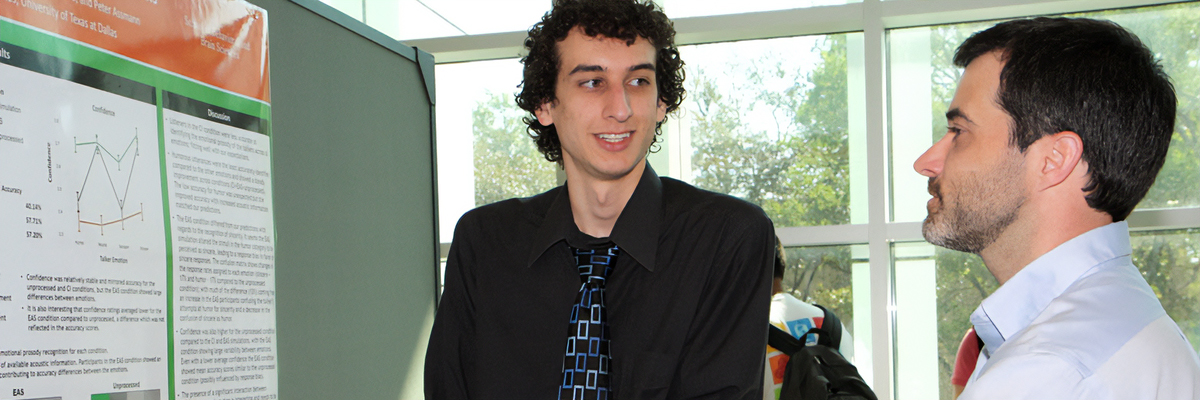Psychology MS
The Master of Science in Psychology degree provides advanced training in psychology

The Master of Science in Psychology (PSYC) degree provides advanced training in psychology. A strong emphasis of this program is research training, helping serious student scholars become more competitive for nationally prominent doctoral programs in psychology as well as for applied careers in areas such as program management, data analysis and research science.
As part of the program, students take advanced coursework in psychology and attend professional development workshops. In addition, students are required to work with a research mentor and to be actively involved in a research laboratory throughout the two-year training. During their final semester in the program, they work with their research mentor to develop and present a scientific poster on a research project.
Watch the recording of the virtual information session held on 11/13/2023 about the Master of Science in Psychology degree program.
Degree Program
Students earning a master’s degree in psychology specialize in one of four major fields: developmental psychology, cognition, social/personality psychology or neuroscience. The curriculum is research-focused. Throughout the program, students work with a research mentor in their area of specialization.
The degree requires 36 graduate credit hours: six hours of core courses in the student’s major field, six hours of core courses from one of the other specialization areas, six hours of core courses in research methods, 12 hours of advanced electives, and six hours of independent research.
The Master of Science in Psychology degree is designed for full-time, degree-seeking students, and most courses are offered only during the day. Students move together through the program as a cohort beginning in the fall term; it is not possible to start the program in the spring or summer term.
The UT Dallas graduate catalog provides more information on the PSYC degree program; the university’s course look-up site, CourseBook, describes specific courses in the PSYC program.
Career Paths
The master’s degree program in psychology is excellent preparation for doctoral programs in psychology. This program is also ideal for individuals interested in applied careers where strong skills in designing, conducting, and understanding research are useful, including careers in data analysis and program management. Please note that this program is not designed to provide clinical training nor does it lead to licensure as a counselor or psychologist.
Admissions
Admission to the Master of Science in Psychology degree program is based on a review of the applicant’s grade point average (GPA). Graduate Record Exam (GRE) General Test scores, research experience and background in psychology, research fit with potential faculty mentors, three letters of recommendation, and a “statement of purpose” essay describing the applicant’s specific interests in research and working with potential mentors. See the UT Dallas graduate admission page for general information on the application process.
The application deadline for the fall semester is February 15.
As noted above, there is not a non-degree seeking option for the PSYC master’s degree program. In general, applicants to this program will have undergraduate backgrounds in psychology. Although students’ qualifications will be evaluated on a case-by-case basis, most students accepted for this program will have psychology research experience and have had courses in statistics and research design, developmental psychology, cognitive psychology, social psychology, personality psychology and abnormal psychology.
Specific questions about applying to the psychology master’s degree program should be directed to ms.psych@utdallas.edu.
Graduate Application Fee Waiver Program
The Office of Graduate Education and the Office of Admission and Enrollment at The University of Texas at Dallas are pleased to offer a Graduate Application Fee Waiver Program to qualified participants (past or present). To qualify, students must be applying for a PhD or Master’s degree at UT Dallas. Non-degree applicants are not eligible for fee waivers. Only U.S. citizens and permanent residents, are eligible to request a fee waiver.
Financial Aid
We understand that the cost of education can be a significant financial burden. For general financial aid information, please visit the main graduate admissions financial aid page.
Frequently Asked Questions (FAQ)
What are the GPA and GRE Requirements for Admission?
Although there is no specific GPA or GRE cutoff for admission, most students admitted to the master’s degree program have an overall GPA of at least 3.0 and a GRE of 300 or higher. That said, applications are considered holistically, and it is possible that strengths in most parts of an application will outweigh weaknesses in another part.
How Many Students do you Accept Each Semester?
The program is small, which allows for plenty of individual attention and directed training. We typically enroll 10-18 students who start in the fall semester. Classes are small, ranging from approximately six to 30 students.
What are the Requirements for Students Coming from Out-of-Field?
In general, applicants to this program will have undergraduate backgrounds in psychology, and although students’ qualifications will be evaluated on a case-by-case basis, most students accepted for this program will have had the following courses:
* Introduction to Psychology
* Statistics and Research Design for Behavioral Sciences
* Developmental Psychology
* Cognitive Psychology
* Social Psychology
* Personality Psychology
* Abnormal Psychology
Students who do not have undergraduate backgrounds in psychology but wish to pursue graduate study in the master’s program in Psychology can inquire with the UT Dallas Admissions department about taking the prerequisite undergraduate psychology courses.
Does the Master’s Degree Program Offer Scholarships or Financial Aid?
There are limited resources for supporting incoming master’s students. Students can apply for need-based financial assistance, including loans, grants and work-study positions, through the University’s Office of Financial Aid. Students offered work-study as part of their financial aid package will find opportunities for employment at the University, including some clerical and research positions. In addition, all non-resident students are automatically considered for a limited number of competitive scholarships that reduce the cost of nonresident tuition. Availability varies depending on the year; non-resident students will be contacted if they will receive a scholarship.
Can I Visit the Master’s Degree Program?
The program welcomes visitors before or after admission. We do not have a specified visitor’s day, but are always happy to answer your questions and visit with you about the program. It is always best to email the program to schedule a time to visit.
Where Should I Live?
The majority (if not all) of your classes will be located at the UT Dallas main campus in Richardson. Plan accordingly when deciding on a place to live. Public transportation is often limited, but commuting by car is relatively easy and many students live in other areas of the community. Some student housing is available on the main campus in Richardson, but on-campus housing caters primarily to undergraduates. You can use online search engines to find options that fit your price range and target location.
How Big Is The Master’s Degree Program?
The UT Dallas master’s degree program in psychology has between 20 and 30 full-time enrolled students. We are careful to ensure that all students have access to faculty and that we have very strong academic advising. We encourage you to talk with current students and graduates about their experiences.
What are the Outcomes for Master’s degree graduates?
The master’s program in psychology is excellent preparation for doctoral programs in psychology, which can lead to professional careers as academic, clinical, industrial and other kinds of psychologists. Our research-intensive training also prepares students for careers in research management and data analysis after graduation. This program does not provide clinical training or lead to licensure as a counselor or psychologist.
Does UT Dallas Have a Clinical Psychology or Counseling Program?
No, we do not offer a clinical or counseling master’s or PhD degree.
Should I apply for the master’s program or the PhD program?
This depends on your goals. The master’s degree is appropriate for students interested in broad psychology training beyond the undergraduate level or to provide additional training to prepare them for applying to doctoral programs in clinical psychology and other areas of psychology. The PhD program is appropriate for students interested in careers in research and teaching and involves extensive training in research design and methodology.
Do Students in this Program Obtain Research Experience?
Yes. Research experience is an integral part of our program. Students are expected to be actively involved in at least one research laboratory throughout the two-year training, assisting with data collection, coding, data entry and analyses, and helping to supervise undergraduate research assistants. Over the course of their time in the program, students gradually become more independent in their laboratory work. At the start of their second year, master’s students begin a focused research project (often involving the data collected with the mentor’s lab), to be analyzed and presented at a special research poster session at the end of the second year.
Program Contacts
Program Head
Robert Ackerman, PhD
Office: GR 4.805
Phone: 972-883-2459
robert.ackerman@utdallas.edu
Program Coordinator
Kristi Noel
Office: JO 4.302
Phone: 972-883-2368
ms.psych@utdallas.edu
Program Mailing Address
Psychology Master’s Degree Program
ATTN Kristi Noel
School of Behavioral and Brain Sciences
The University of Texas at Dallas
800 W. Campbell Rd., GR41
Richardson, TX 75080
Program Resources
Psychology MS Fast Facts
This document provides a quick, printable overview of the program.






